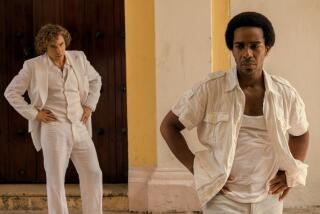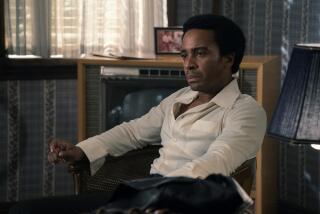Playing a character you’ll hate to love
- Share via
Toronto — Aaron Eckhart has played nice guys, bad guys and terrible guys, most notably in Neil LaBute’s “In the Company of Men.” So, when you hear that his character in Jason Reitman’s “Thank You for Smoking,” one of the most buzzed about films at the Toronto International Film Festival, is the chief spokesman for the tobacco lobby, you basically expect the worst guy ever.
Eckhart plays Nick Naylor, vice president of the Academy for Tobacco Studies (a bogus research arm backed by big tobacco) and universally despised professional scumbag. That he’s a charming, charismatic, caring and really pretty sensitive, universally despised scumbag comes as a surprise.
The film, which was acquired Sunday by Fox Searchlight for a rumored $6 million, premiered Friday night at the festival. On Saturday morning, I talked with Eckhart in a quiet corner of an otherwise hectic hotel bar.
Tall, blond and prodigiously chinned, the 37-year-old actor looks a lot like a Sigma Chi who might have gone on to successfully head up a sales department somewhere if he hadn’t gone into acting. If there were doubts, this movie makes it clear that he made the right decision. Nick Naylor is a guy you hate to love.
“Nick is a tobacco lobbyist who loves his job and doesn’t apologize for it, which [as a role] is exciting and fun because it’s politically incorrect and titillating -- you get great jokes out of it,” Eckhart said.
An outrageously impious satire of the culture of spin, which skewers corporate mendacity, political correctness and legislative hypocrisy with equal ferocity and humor, “Thank You for Smoking” was adapted by Reitman (son of veteran director Ivan Reitman, making his feature debut) from a novel by Christopher Buckley. Reitman, who called shortly after the movie was acquired, said he decided to cast Eckhart after seeing the particular range of his performances.
“David Sacks, the producer, and I spoke about how he’s a complicated character [in ‘Smoking’] who has to deliver vicious lines and still be charming and be a good father. I looked at the contrast between Aaron’s character in ‘In the Company of Men’ and then who he was in ‘Erin Brockovich,’ and it was a combination of that. When he read the script, I flew to Vancouver to see him. He gave me this great smile and I said, ‘Aaron, you should smile more. People should see you smile.’ ”
The book was written in the politically correct 1990s and lampoons the hysteria surrounding hot-button health and political issues. But in this era of rampant corporate malfeasance, where seemingly no public figure has ever met a word he or she couldn’t spin, the movie adaptation seems particularly relevant. Nick may not be the man in charge of peddling nicotine -- that would be Robert Duvall, as the “Colonel Sanders of cigarettes” -- but whether that absolves him of moral responsibility is another question.
Nick likes to say that he’s “just paying the mortgage” like everybody else. (Among them Maria Bello and David Koechner as Nick’s close friends, who are spokespeople for the alcohol and firearms lobbies, respectively -- the three call themselves “the M.O.D. Squad,” for “merchants of death”; William H. Macy as Ortolan Finistirre, a liberal senator from Vermont; Katie Holmes as a manipulative newspaper reporter; and Rob Lowe as a farcically pretentious Hollywood superagent who meets with Nick to discuss co-branding possibilities.) But he’s also honest enough with himself to acknowledge that this is basically “the yuppie Nuremberg defense,” and so convincing that even Eckhart isn’t sure whether he can find the line.
“I don’t think people can be mad at Nick or hold anything against him, because he almost makes fun of himself,” Reitman said. “He knows how other people feel about him. So he disarms them. He will not allow them to get into his head because he already knows their position on him.”
“Thank You for Smoking” is a morality play in a world where morality is so miasmic that nobody can get a foothold. “I see Nick as a public defender of corporations gone bad,” said Reitman. “Everyone deserves a good defense, and his job is to come to their rescue. Just like if you’re a defense attorney, and your best defense would be of your most evil client.”
As Eckhart explains his character, “For Nick, the game, basically, is convincing people. It’s getting people to look at things your way. That’s the big game in life, and that’s what he’s teaching his son. That’s what he and his friends talk about when they get together. He’s not defending cigarettes so much as he’s defending his right to defend cigarettes.”
In fact, nobody in the movie is seen to smoke, even though Eckhart and other characters are identified as smokers. Said Reitman, “Very early on, I decided I didn’t want smoking in the movie. It’s not really a movie about smoking, but about lobbying. Tobacco is just the setting. It’s not that I believe in the idea that movies should be responsible and not show smoking. But I think if the characters had been smoking, it would have seemed a pro-smoking movie, whereas it’s about lobbying and spin and talk.”
Reitman’s adaptation focuses on the relationship between Nick and his 12-year-old son, Joey (Cameron Bright), from whose mother he is divorced.
“He just wants to be with his kid, teach his kid and have his kid respect him. Tobacco doesn’t mean anything to him. He’s just a guy who loves to talk and loves to win.” Nick uses the “moral flexibility” to explain why he’s good at his job. But no character in the film is completely, morally inflexible either. They’re just adamant about sticking to their guns.
“All these people are so firm on their positions. That’s where the humor in the movie comes from,” said Eckhart. “It’s like the debate team. Nothing is rooted, everything is malleable. As soon as you start to hate what Nick Naylor is saying, then you have a senator saying the same thing. Everybody is complicit; whatever their cause is, they all have unethical thoughts. It just shows that we’re all just out there trying to ply our trade.”
Eckhart read the script for “Thank You for Smoking” while he was in Vancouver shooting “Neverwas,” which also premiered at the festival, and in which he plays an idealistic psychiatrist, also literally a prince in a fairy tale. But he had no qualms about playing a Big Tobacco lobbyist.
“I was doing another movie right after it. And at first, I thought, ‘I don’t know how I can do this movie.’ Then I read it and thought, ‘I’ve got to do this movie.’ I was even supposed to do another movie and I had to get out of it. When I met Jason, he totally sold me on it. He had his own vision. He knew what he wanted and didn’t vacillate. We’re both fans of Alexander Payne [who directed ‘Sideways’], and he really wanted to do it in that vein, and I’m into that. It has heart, but a lot of it is tongue-in-cheek. I can’t believe everybody in Hollywood didn’t want to do it. I mean, this is Michael Douglas territory. You get a character like that, and you make it.”
What sold Eckhart on the character of Nick was his relationship with his son, which Reitman made more prominent in the film. “It gives the movie heart,” said the actor.
Reitman’s own relationship with his director father may have been an inspiration. “My father’s been a tremendous influence on me,” he says. “He taught me to be a storyteller. After years of saying I should avoid this business like the plague, when he saw it was in my heart, he really supported me. My film education comes from watching him. And he was knocked out by Aaron’s performance.”
The hardest thing about playing Nick, Eckhart said, was also the thing he loved most. “Making him a talker and getting that energy right. It’s a fine line between being a talker and just being a jerk, talking without feeling anything. It was the same thing in ‘In the Company of Men,’ I tried to inject humanism in an inhumane situation. That’s the toughest and the most enjoyable when it works. Also, I haven’t always made people laugh in movies, and if I got a couple of laughs, then I’m happy.”
*
Times film critic Carina Chocano can be e-mailed at Carina.Chocano@latimes.com.
More to Read
Only good movies
Get the Indie Focus newsletter, Mark Olsen's weekly guide to the world of cinema.
You may occasionally receive promotional content from the Los Angeles Times.








